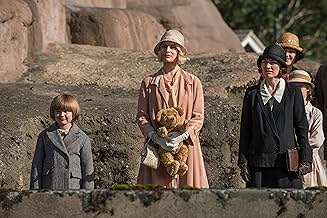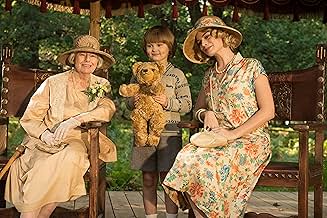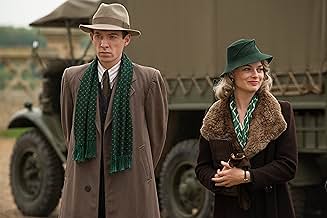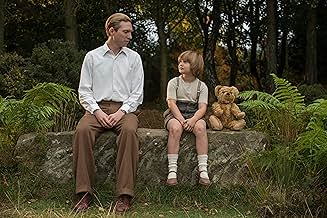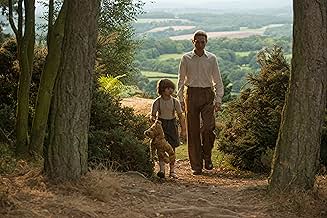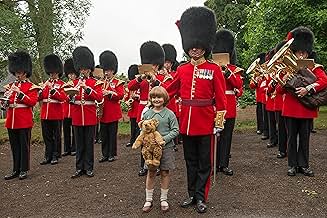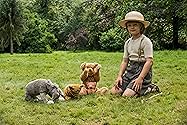La relation entre l'écrivain AA Milne et son fils, Christopher Robin, et comment il devint une inspiration pour l'histoire de Winnie l'Ourson.La relation entre l'écrivain AA Milne et son fils, Christopher Robin, et comment il devint une inspiration pour l'histoire de Winnie l'Ourson.La relation entre l'écrivain AA Milne et son fils, Christopher Robin, et comment il devint une inspiration pour l'histoire de Winnie l'Ourson.
- Prix
- 2 victoires et 3 nominations au total
Histoire
Le saviez-vous
- AnecdotesThe film's depiction of C.R. Milne's relationship with his parents is relatively accurate. The actual C.R. never forgave his father for exploiting him (perhaps inadvertently) to sell books. Instead, he learned to accept what had happened and lived with it until he died in 1996. His relationship with his mother was worse; she disapproved of C.R. marrying his cousin. After A.A. Milne died in 1956, C.R. had almost no contact with his mother until she died fifteen years later. C.R.'s only child, his daughter Claire, was born with cerebral palsy. She died in 2012 at age 56.
- GaffesWhen the Guards band are playing, several are wearing modern day medals (Iraq, Afghanistan etc.). The close up of the cymbal player shows the Queen's Golden and Diamond Jubilee Medal which weren't awarded till 2002 and 2012, alongside a LSGC with Queen Elizabeth II on it.
- Citations
Daphne Milne: You know what writing a book against war is like? It's like writing a book against Wednesdays. Wednesdays... are a fact of life, and if you don't like them, you could just stay in bed, but you can't stop them because Wednesdays are coming and if today isn't actually a Wednesday it soon will be.
- ConnexionsFeatured in Box Office: Episode dated 28 September 2017 (2017)
- Bandes originales2 Waltzes, Op. 54: Waltz No. 1: Moderato in A Major
Written by Antonín Dvorák
Performed by Vlach Quartet Prague
Courtesy of Naxos Rights US Inc.
Commentaire en vedette
The thought of a biopic that charts the touching story of the creation of a children's tale that has meant so much to so many over the years instantly makes me think of Finding Neverland, a sweet film I'm very fond of. In many ways, Goodbye Christopher Robin is very similar – bitter-sweet, heart-warming, full of nostalgia; you could easily swap Johnny Depp for Domhnall Gleeson and Kate Winslet for Margot Robbie (although the characters differ greatly). Although this story behind Winnie the Pooh doesn't contain quite the same childish magic and glee that the story behind Peter Pan gave us, it's still a delightful, emotional story told in a joyful, touching way.
The film as a whole addresses several themes and it's really a bit of a mishmash – it's not just about the creation of the Winnie the Pooh books; it's about the impact of war, the troubles with early 20th century parenting, tricky father-son relationships, the joy and innocence of childhood, and the pain and price of fame. This all works as both a strength and a weakness of the film; in many ways it's wonderful to have such a wealth of topics and the variety keeps things fresh and interesting. On the other hand, some themes aren't fully explored to the extent they could be and it feels as though it's missing something occasionally. It never really focuses on one theme and so does tend to meander around all these topics, telling a vague story; at times it seems to be more a series of scenes with just a semblance of story. Of course this is because the story itself is fairly simple, so it's nice that they enriched the plot with so many themes; it just feels as though it could have benefited from a little more detail.
Nevertheless it's a film that's a joy to watch and brings with it a load of emotions – sniffles and tears seemed to permeate the cinema. This is down to a couple of things; firstly the characters and the story they go through together; but more than that all the references (some obvious, some subtle) to Winnie the Pooh and the rest of Milne's work. From small quotations and images, to creating a little wooden hut to house one of Billy's toys, there are plenty of nods to Winnie the Pooh and these can't fail to bring a nostalgic tear to anyone and awaken fond childhood memories. The childhood especially is heavily romanticised and anyone can identify with Billy Moon in some way, bringing to mind all the happiness and innocence we experienced as children. This is all complimented by beautiful cinematography, making the wilds of Ashdown Forest seem absolutely stunning and really strengthening the magical quality of childhood and its inexhaustible supply of imagination and charm. In fact it's this middle section where the world of Winnie the Pooh is created that is the strongest part.
There aren't a great many characters in this film, making it all seem more intimate, allowing us to grow attached to the characters – though at times this can be challenging. As excellent as Gleeson is, it can be sometimes difficult to understand and empathise with him as his character is so stiff and reserved; still Gleeson gives us a wonderful contrast to this and how time with his son helps him to loosen up and re-discover his 'inner child'. Margot Robbie's Daphne comes across as a missed opportunity. Stunning and beautiful as always, it's hard to imagine Robbie playing a detestable character, but this she manages to do and do well. It's just the writing doesn't really seem to do her credit as we aren't given a real insight into her character. Kelly Macdonald and Will Tilston do shine though. Macdonald's Olive grounds the film as the friendliest, least complex adult character and Tilston exceeds all expectations you would have from a nine year old in their first ever acting role. Sheer innocence and childishness emanates effortlessly from his big eyes and little movements. He really is the heart of the film and fortunately they make the most of him. Sadly every boy has to grow up, but Billy Moon's 18 year old self played by Alex Lawther fills the shoes of his younger counterpart well, giving us the necessary angst and emotion needed.
Perhaps not quite the early Oscar contender I hoped for and it lacks some of the magic that I loved in similar film Finding Neverland. However, this is still a great film, dripping with emotion, nostalgia and a romantic view of childhood; exploring a wealth of themes and with some excellent performances (particularly from the titular Christopher Robin) and affectionate references to a childhood classic, Goodbye Christopher Robin is a lovely, bittersweet film for the whole family. Bring the tissues – this one's going to move you.
The film as a whole addresses several themes and it's really a bit of a mishmash – it's not just about the creation of the Winnie the Pooh books; it's about the impact of war, the troubles with early 20th century parenting, tricky father-son relationships, the joy and innocence of childhood, and the pain and price of fame. This all works as both a strength and a weakness of the film; in many ways it's wonderful to have such a wealth of topics and the variety keeps things fresh and interesting. On the other hand, some themes aren't fully explored to the extent they could be and it feels as though it's missing something occasionally. It never really focuses on one theme and so does tend to meander around all these topics, telling a vague story; at times it seems to be more a series of scenes with just a semblance of story. Of course this is because the story itself is fairly simple, so it's nice that they enriched the plot with so many themes; it just feels as though it could have benefited from a little more detail.
Nevertheless it's a film that's a joy to watch and brings with it a load of emotions – sniffles and tears seemed to permeate the cinema. This is down to a couple of things; firstly the characters and the story they go through together; but more than that all the references (some obvious, some subtle) to Winnie the Pooh and the rest of Milne's work. From small quotations and images, to creating a little wooden hut to house one of Billy's toys, there are plenty of nods to Winnie the Pooh and these can't fail to bring a nostalgic tear to anyone and awaken fond childhood memories. The childhood especially is heavily romanticised and anyone can identify with Billy Moon in some way, bringing to mind all the happiness and innocence we experienced as children. This is all complimented by beautiful cinematography, making the wilds of Ashdown Forest seem absolutely stunning and really strengthening the magical quality of childhood and its inexhaustible supply of imagination and charm. In fact it's this middle section where the world of Winnie the Pooh is created that is the strongest part.
There aren't a great many characters in this film, making it all seem more intimate, allowing us to grow attached to the characters – though at times this can be challenging. As excellent as Gleeson is, it can be sometimes difficult to understand and empathise with him as his character is so stiff and reserved; still Gleeson gives us a wonderful contrast to this and how time with his son helps him to loosen up and re-discover his 'inner child'. Margot Robbie's Daphne comes across as a missed opportunity. Stunning and beautiful as always, it's hard to imagine Robbie playing a detestable character, but this she manages to do and do well. It's just the writing doesn't really seem to do her credit as we aren't given a real insight into her character. Kelly Macdonald and Will Tilston do shine though. Macdonald's Olive grounds the film as the friendliest, least complex adult character and Tilston exceeds all expectations you would have from a nine year old in their first ever acting role. Sheer innocence and childishness emanates effortlessly from his big eyes and little movements. He really is the heart of the film and fortunately they make the most of him. Sadly every boy has to grow up, but Billy Moon's 18 year old self played by Alex Lawther fills the shoes of his younger counterpart well, giving us the necessary angst and emotion needed.
Perhaps not quite the early Oscar contender I hoped for and it lacks some of the magic that I loved in similar film Finding Neverland. However, this is still a great film, dripping with emotion, nostalgia and a romantic view of childhood; exploring a wealth of themes and with some excellent performances (particularly from the titular Christopher Robin) and affectionate references to a childhood classic, Goodbye Christopher Robin is a lovely, bittersweet film for the whole family. Bring the tissues – this one's going to move you.
- mt-95256
- 30 sept. 2017
- Lien permanent
Meilleurs choix
Connectez-vous pour évaluer et surveiller les recommandations personnalisées
- How long is Goodbye Christopher Robin?Propulsé par Alexa
Détails
- Date de sortie
- Pays d’origine
- Sites officiels
- Langue
- Aussi connu sous le nom de
- Tạm Biệt Christopher Robin
- Lieux de tournage
- sociétés de production
- Consultez plus de crédits d'entreprise sur IMDbPro
Box-office
- Brut – États-Unis et Canada
- 1 735 251 $ US
- Fin de semaine d'ouverture – États-Unis et Canada
- 57 917 $ US
- 15 oct. 2017
- Brut – à l'échelle mondiale
- 7 401 949 $ US
- Durée1 heure 47 minutes
- Couleur
- Mixage
- Rapport de forme
- 1.85 : 1
Contribuer à cette page
Suggérer une modification ou ajouter du contenu manquant

Lacune principale
What is the streaming release date of Goodbye Christopher Robin (2017) in Brazil?
Répondre






